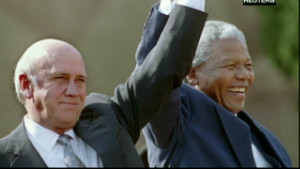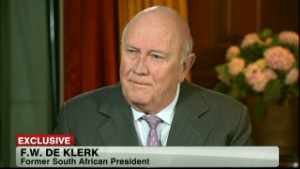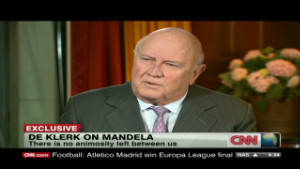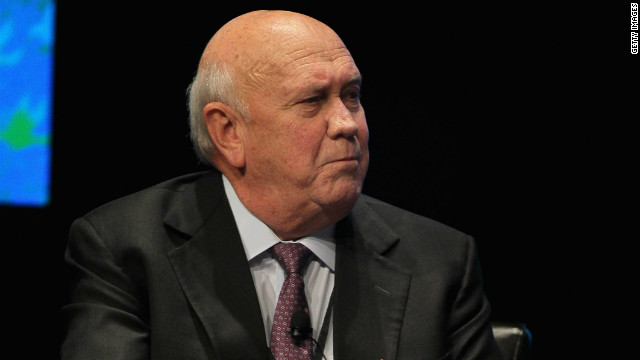ay 17, 2012 -- Updated 0417 GMT (1217 HKT)
Former South African president FW de Klerk pictured in Chicago in April.
STORY HIGHLIGHTS
- F.W. de Klerk drew criticism for not fully repudiating the concept of apartheid
- He clarifies his remarks Wednesday, saying he has no belief in segregation
- His foundations said last week that the original comments were taken out of context
- Many have waited for de Klerk to renounce the brutal era of South Africa's history
(CNN) -- Under fire for his comments on apartheid, former South African President F.W. de Klerk clarified his position again Wednesday, saying that he repudiates the system of racial segregation as unacceptable.
De Klerk called apartheid "morally unjustifiable" and "that it could not be reformed, that the concept of separate development had led to manifest injustice and had to be abandoned."
"I have no residual belief in, or attachment to, separate development," de Klerk said in a statement.
Many South Africans say they have waited for their former president, who helped dismantle apartheid and give rise to Nelson Mandela's presidency, to renounce the brutal period of their nation's history.
CNN offered that opportunity to de Klerk last week.
In the original CNN interview, de Klerk would not back off his belief in the validity of the concept of "separate but equal" nation states.
"I'm offering you the opportunity as the person who helped dismantle apartheid to say whether or not you believed that it was also morally repugnant, today, in retrospect," Amanpour said.
I have no residual belief in, or attachment to, separate development
F.W. de Klerk, former South African president
F.W. de Klerk, former South African president
De Klerk repudiated the effects of apartheid, but not the concept.

"I can only say that in a qualified way," de Klerk said. "In as much as it trampled human rights, it was -- and remains, and that I've said also publicly -- morally indefensible. There were many aspects which are morally indefensible."

The qualified statement drew criticism on Twitter and in South African and international media.

"I don't apologize for saying that what drove me as a young man, before I decided we need to embrace a new vision, was a quest to bring justice for black South Africans in a way which would not -- that's what I believed then -- destroy the justice to which my people were entitled," de Klerk said last week on CNN. "My people, whose self-determination (was) taken away by colonial power in the Anglo-Boer War."
And De Klerk's foundation said the former president's initial remarks on CNN had been taken out of context.
"The F.W. de Klerk Foundation regrets that the comments that F.W. de Klerk made in his recent interview with Christiane Amanpour of CNN have been taken so unfairly out of context," the foundation said in a statement last Friday.
"The question that she asked related to the policies that he had supported when he was a young man -- and his reply centered on his view that, though idealistic at the time, they had resulted in the unacceptable injustices of apartheid," the foundation said.
De Klerk, 76, shared the 1933 Nobel Peace Prize with Mandela, 93, for their efforts to abolish apartheid. Following the remarks, critics have called for de Klerk to be stripped of the honor.
De Klerk told CNN that he and Mandela have been "close friends."
"Not the closest in the sense that we see each other once a week," he said. "But he's been in my home as a guest. I've been in his home as a guest. When I go to Johannesburg, my wife and I will have tea with him and Graca, his wife.
"There is no animosity left between us," he said.
However, his opinion on the African National Congress, South Africa's governing party once led by Mandela, was less kind.
The ANC, de Klerk said, has wielded too much power and its leaders have lost their "moral compass."


No comments:
Post a Comment